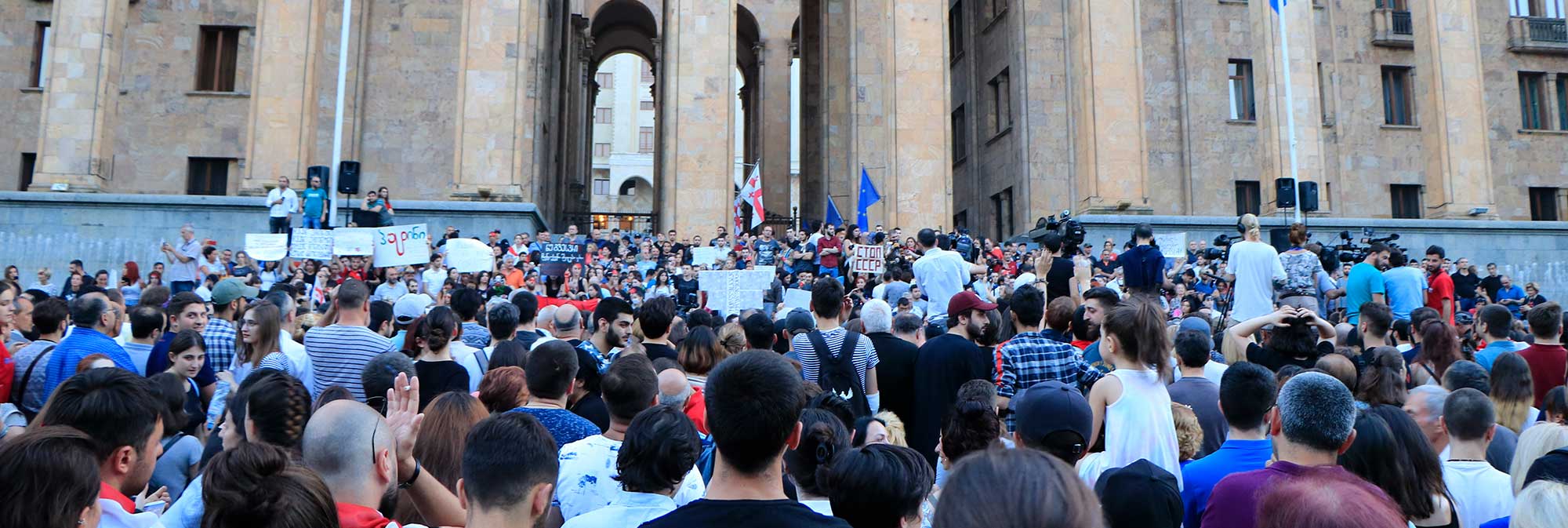A nation must think before it acts.
Citizens of Georgia have been protesting for the past week in response to a Russian parliamentary delegation visit. The protests in Tbilisi have shed new light on Georgian political dynamics, civil society, and the country’s future.
After Sergey Gavrilov, a member of Russia’s Duma, sat in the Georgian Parliament Speaker’s chair and addressed the forum in Russian, public outrage took a violent turn. A clash with riot police left over 200 protesters severely injured and over 300 detained. Video evidence shows use of extreme force against the protesters.
The protesters have made three major demands: 1. Adopting a proportional voting system in time for the 2020 parliamentary election (previously scheduled for adoption for 2024); 2. Releasing the 300+ protesters arrested on the night of June 20; 3. Removing Minister of Interior Giorgi Gakharia from his post, and punishing anyone responsible for the riot police’s violence.
The government eventually agreed to meet the first two demands, but when confronted with the final demand regarding Gakharia and government responsibility, Georgian Dream (GD) leaders placed blame on opposition parliamentarians, particularly the United National Movement (UNM), referring to them to as the “black plague.” They also continuously threaten to punish instigators among the opposition politicians. Furthermore, GD politicians have been borrowing the Kremlin’s vocabulary, consistently calling the opposition parties “extremists, terrorists, and provocateurs.” To date, the GD has shown an unwillingness to enter into a discussion on the government’s responsibility for June 20.
Georgian Dream Becomes a Nightmare for Nika Melia
After a heated day in parliament on June 26, Georgian Dream MPs voted 91-0 in favor of stripping parliamentary immunity from Nika Melia, one of the opposition leaders from UNM. Earlier that day, the prosecutor’s office approached the parliament with the request of stripping Melia of his immunity, so they could arrest him. The prosecutors claimed that Melia was a flight risk, and could even tamper witnesses. The prosecutor’s office told the parliament that they have evidence showing that Melia urged the protesters to storm the parliament building on June 20 in order to overthrow the government.
At Melia’s request, all opposition MPs boycotted the vote, and marched out of the parliament, leaving Melia alone in a dramatic face-off with GD MPs during the hearing before the vote took place. With his parliamentary immunity revoked, Melia now faces 6-9 years in prison. On June 27, the prosecution’s motion for Melia’s pre-trial detention was denied by the Tbilisi City Court, and instead bail was set to 30,000 lari (approx. 10,500 USD). The Court ordered Melia to remain home during the investigation, and he is to refrain from appearing and speaking in public gathering places.
Melia’s case seems to be more alarming to outside observers and political opposition leaders than to the protesters on Rustaveli Avenue. Melia himself asked the protesters not to lose sight of their key demands, and not to make the protest about him. Melia did not have to do much convincing because Melia is not very popular among Georgians. The protesters believe that his arrest is unfair, but they do not plan to amend their demands.
What’s the Word on Rustaveli Avenue?
Mainstream media in Georgia has placed outsized emphasis on the voices of the political opposition leaders. The politicians have shown restraint and maturity while expressing their frustration and outrage over the government’s behavior—from the GD’s refusal to take responsibility to the prosecution of Melia. However, the politicians do not speak for the protesters; they are reluctantly included in the protests, but are not viewed as leaders of the movement. The true power rests in the overwhelmingly young civil society members who keep coming out in droves.
With Gakharis’s resignation not currently in the cards, there are two looming questions: Will the protests end with the GD eventually meeting the rest of the standing demands? Or will the protests escalate out of continued public frustration and lead to GD government’s collapse?
Surveying the non-politician protesters on Rustaveli Avenue has revealed that they aren’t demanding early elections or the dissolution of the government, so the second scenario is unlikely right now.[1] The protesters wish to change the bipolar political system, which is characterized by the traditional power balance between the UNM and GD. Although they received a green light on electoral reform, switching from a mixed to proportional voting system will take some time and certainly cannot happen overnight. The voters believe that only the UNM and GD would win a snap election, and regardless of which party attains a parliamentary majority, ultimately not much would change.
Therefore, protesters are careful not to make any rash decisions, and want to make sure they get a fair chance at peacefully voting out GD in 2020 by giving other political actors enough time to prepare for the election.
The protesters’ demands have remained measured and arguably reasonable. These demands have remained unchanged in the face of frustrating answers from the government, provocative commentary from Moscow, and a controversial arrest of an opposition leader. Moreover, their priority remains a guarantee of elections a year from now. The desire to peacefully vote out the GD government and the need for moderation are carefully articulated by the young protesters. Despite these factors, the protesters lack leadership capable of engaging and negotiating with the government. But, the last few days have shown that a handful of European Georgia party leaders, chief among them Tamar Kordzaia and Elene Khoshtaria, seem to be earning the protesters’ trust and respect.
The situation in Georgia remains fluid as the protesters attempt to stay the course in the face of growing challenges. They have planned another demonstration—with the goal of it being larger than the ongoing ones—for June 29.
[1] The remarks are based on the author’s interviews with five of the protesters.




